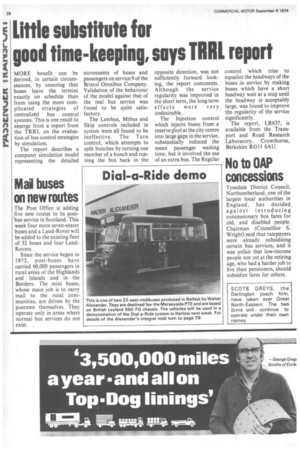Little substitute for good time-keeping, says IRK report
Page 30

If you've noticed an error in this article please click here to report it so we can fix it.
MORE benefit can be derived, in certain circumstances, by ensuring that buses leave the termini exactly on schedule than from using the more complicated strategies of centralized bus control systems. This is one result to emerge from a report from the TRRL on the evaluation of bus control strategies by simulation.
The report describes a computer simulation model representing the detailed movements of buses and passengers on service 9 of the Bristol Omnibus Company. Validation of the behaviour of the model against that of the real bus service was found to be quite satisfactory.
The Latebus, Mtbus and Skip controls included in system were all found to be ineffective. The Turn control, which attempts to split bunches by turning one member of a bunch and running the bus back in the opposite direction, was not sufficiently forward looking, the report comments. Although the service regularity was improved in the short term, the long term effects were very undesirable.
The Injection control which injects buses from a reserve pool at the city centre into large gaps in the service, substantially reduced the mean passenger waiting time, but it involved the use of an extra bus. The Regular control which tries to equalize the headways of the buses in service by making buses which have a short headway wait at a stop until the headway is acceptably large, was found to improve the regularity of the service significantly.
The report, LR637, is available from the Transport and Road Research Laboratory. Crowthorne, Berkshire RG11 6AU.


























































































































































